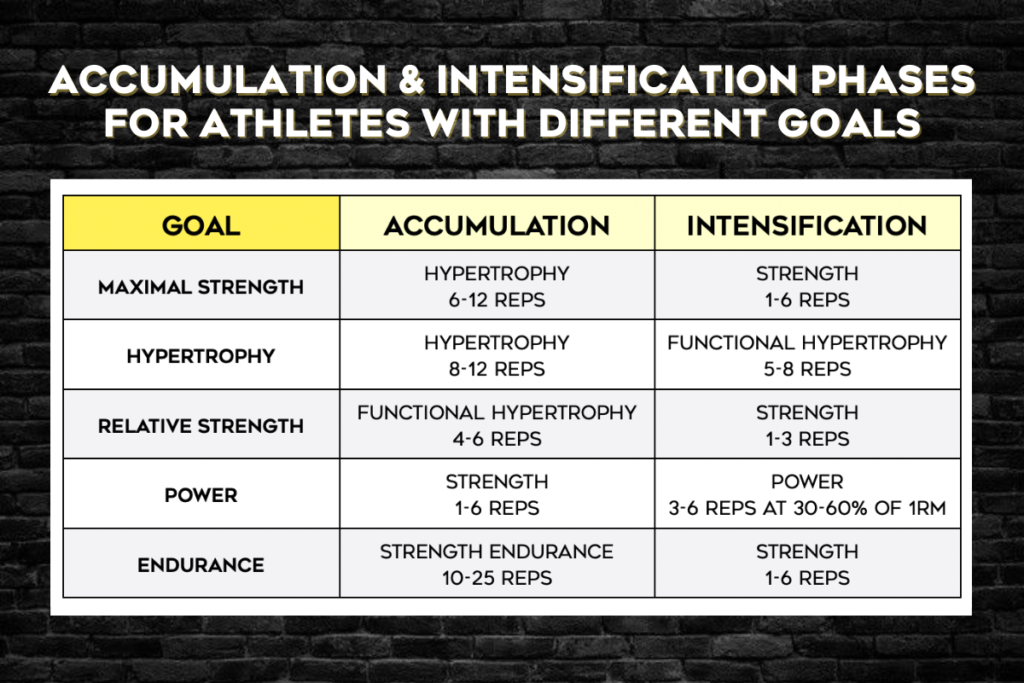
Written by Stefan Ianev (Clean Health Research & Development Specialist)
Undulating periodization was popularized by famed strength coach Charles Poliquin who used it with great success in producing world record holders across multiple sports.
The undulating model aims to overcome some of the limitations associated with traditional linear periodization. The main limitations with linear periodization are that a large percentage of the time is spent working with loads that are not optimal for increasing maximal strength, and some of the structural adaptations which are developed in the early phases are lost in the later phases.
Undulating periodization tries to overcome this by alternating short accumulation phases with short intensification phases.
During accumulation phases the overall volume and is higher and the intensity is lower, with the emphasis being on structural adaptations. This is similar to the early stages of the linear model. An accumulation phase also gives the nervous system and connective tissue a break from heavy lifting which can help avoid stagnation and reduce the chance of injury.
During an intensification phase, the overall volume is lower, and the intensity is higher, with the emphasis being more on neurological adaptations. This is similar to the later phases of the linear model.
Keep in mind that the terms accumulation and intensification are relative. This is because an accumulation phase for one athlete can be an intensification phase for another depending on the athletes training age and the primary quality that they are trying to develop.
Below is an example of accumulation and intensification phases for athletes with different goals:

Maximal Strength
Accumulation: Hypertrophy (6-12 reps)
Intensification: Strength (1-6 reps)
Hypertrophy
Accumulation: Hypertrophy (8-12 reps)
Intensification: Functional Hypertrophy (5-8 reps)
Relative Strength
Accumulation: Functional Hypertrophy (4-6 reps)
Intensification: Strength (1-3 reps)
Power
Accumulation: Strength (1-6 reps)
Intensification: Power (3-6 reps @ 30-60% of 1RM)
Endurance
Accumulation: Strength Endurance (10-25 reps)
Intensification: Strength (1-6 reps)
In the traditional undulating model, athletes typically alternate 2-3 weeks of accumulation with 2-3 weeks of intensification. This allows enough time to dissipate fatigue without losing the adaptations from the previous phase.
Typically, athletes will peak with an intensification phase before a competition apart from endurance athletes who will peak with an accumulation phase because endurance is their end goal.
For strength and power athletes the intensity will progressively increase over the course of a macrocycle is a zig zag like fashion.
Here is an example of a 12-week macrocycle for an athlete wanting to increase maximal strength:
Accumulation 1 (Weeks 1-3): 8-12 reps
Intensification 1 (Weeks 4-6): 3-5 reps
Accumulation 2 (Weeks 7-9): 6-8 reps
Intensification 2 (Weeks 10-12) 1-3 reps
In the second intensification phase there will also be a progressive reduction in volume in terms of the numbers of sets if the athlete needs to peak for an event. Tapering in volume allows the athlete to dissipate accumulated fatigue and unmask their strength gains.
As you can see, with this model an athlete never spends more than 3 weeks at a time lifting with maximal loads which helps prevent burn out, and they are able to maintain structural adaptation into the later phases.
For an athlete that needs to gain more muscle, you can alternate 4 weeks of accumulation with 2-3 weeks of intensification, depending on the length of their off-season.
Want to learn about the science and fundamentals behind program design in great detail when it comes to developing effective strength & conditioning programs such as load selection, technical execution, rest periods, programming principles and more?
Check out the Strength System International Certification Level 1 & 2






